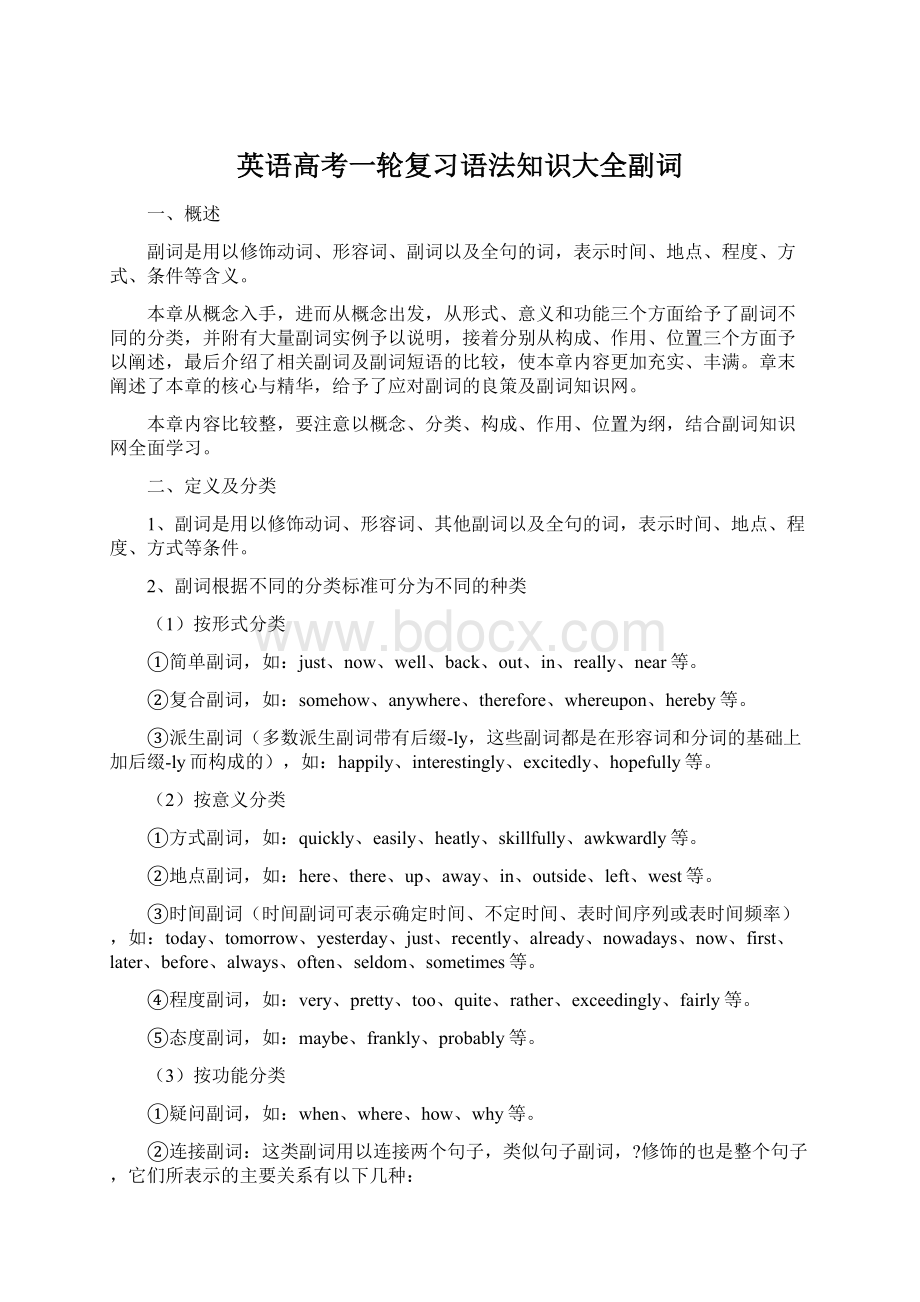英语高考一轮复习语法知识大全副词Word格式.docx
《英语高考一轮复习语法知识大全副词Word格式.docx》由会员分享,可在线阅读,更多相关《英语高考一轮复习语法知识大全副词Word格式.docx(20页珍藏版)》请在冰豆网上搜索。

maybe、frankly、probably等。
(3)按功能分类
①疑问副词,如:
when、where、how、why等。
②连接副词:
这类副词用以连接两个句子,类似句子副词,?
修饰的也是整个句子,它们所表示的主要关系有以下几种:
a、表结果,如:
therefore、hence、according等。
b、表添补(即对信息的添加),如:
moreover、besides、also等。
c、表对比,如:
nevertheless、however等。
d、表条件,如:
otherwise。
e、表时间,如:
then。
③关系副词,如:
when、where、why等用以引导定语从句(在“从句法”一章的定语从句部分再详细阐述,全面展开)。
④解释性副词(这类副词用于举例或列举),如:
namely、suchas、forexample等。
⑤缩合连接副词
英语中除了缩合连接代词外,还有一种缩合连接副词。
这种连接副词与一般连接副词不同,具有缩合性(内含关系副词),并在其所引导的名词性从句与主句之间起连接作用的副词,现将一些缩合连接副词的缩合性及其用法举例说明如下:
when=thetimewhen如:
Youdon’tknowwhenyouarelucky.(when引导宾语从句)
where=theplacewhere,如:
That’swhereLuXunoncelived.(where引导表语从句)
why=thereasonwhy,如:
That’swhyhedidn’tcometoclass.(表语引导宾语从句)
whenever=anytimewhen,如:
Wheneveritisconvenientforyou,youcanvisitme.(whenever引导时间状语从句)
wherever=anyplacewhere,如:
Sitwhereveryoucanlistencarefully.(wherever引导地点状语从句)
⑥句子副词,也称评注性副词(这类副词往往和整个句子具有松散的语法关系,而不是用以修饰某个具体的动词),如:
fortunately、actually、indeed、evidently、obviously、presumably等。
三、副词的构成
1、大部分副词是派生而来的,即由形容词加上后缀-ly构成。
构成法举例
一般情况下直接加-lyquick—quickly、bad—badly
以y结尾的词变y为i加ly(但shy—shyly/shily、gay—gayly/gaily、dry—dryly/drily)happy—happily
angry—angrily
以-le结尾的词省去-e再加y(但supple—supplely、sole—solely、whole—wholely)noble—nobly、able—ably、single—singly
以-ue结尾的词去掉-e再加-ly,以其他字母(即除l和u)加e结尾的直接加-lytrue—truly、due—duly、wide—widely、wise—wisely
以ic结尾的词加-allyeconomic—economically、tragic—tragically
以ly结尾的词变y为i再加lymanly—manlily、chilly—chillily
以ll结尾的词只加yfull—fully、dull—dully
2、有些副词是由介词或地点名词加后缀-ward(s)构成的,表示“向…”,如:
upward(s)、downward(s)、backward(s)、forward(s)、northward(s)、rightward(s)、homeward(s)、inward(s)、onward(s)等。
3、有些副词是由名词加后缀-wise构成的表示位置、方向、状态等含义,如:
clockwise、sidewise、saleswise、taxwise、lengthwise等。
4、某些副词是由名词构成的,如:
daily、weekly、monthly、yearly、nightly、quarterly、fortnightly、leisurely、jolly等,此类词既可作副词,也可作形容词,如:
Inourdailylife,weshouldbecarefulallthetime.(形容词)
Heispaiddailyinthesmallshop.(副词)
Everyweek,wewillhaveseveralweeklyreportsinourclass.(形容词)
Iwenttothelibraryweekly.(副词)
Heenjoysajollylife.(形容词)
Herheartisjollygoodnow.(副词)
注意:
a、manly、costly等名词+ly构成的词只用作形容词。
b、monthly(月刊)、daily(时报)、weekly(周报)、quarterly(季刊)、bimonthly(双月刊)等还可用作名词。
5、有少数副词加后缀-ways、-long、-ling(s)等构成,如:
sideways、lengthways、headlong、sidelings等。
6、有些副词是加前缀a-、here-、there-、where-构成的,如:
away、ashore、aside、herein、thereby、thereafter、wherein、whereon等。
但有些带有前缀a-的副词同时也可作形容词,如:
alike、alone、afoot、aboard、ahead等。
7、可用作副词的名词(有些名词在一些固定词组中,可用作副词作状语),如:
icecold冰冷的daydream做白日梦pitchblack漆黑的stonedeaf全聋的
dogtired累极的dirtcheap便宜极了
8、可用作形容词
有些形容词有时可用作副词,如:
pretty、right、bright、precious、dead、dark、white、devilish、real、icy、bitter、mighty、amazing、burning。
如:
brightyellow鲜黄的darkred深红的icycold冰冷的devilishcold极冷的
realgood真好的deadasleep熟睡burninghot火热的mightynice非常好看
此类用法还经常出现在习惯表达法中
stopcold突然停止playitcool保持冷静talkbig说大话,吹牛等
9、与介词同形的副词
英语中,大多数介词同时可充当副词,不过,作介词时接宾语,作副词时不可接宾语,如:
in、off、beyond、up、about等,这类副词可用作表语、定语、状语、宾语补足语等。
Heisintheclassroom.(介词)
Please,comeinonebyone.(副词)
Heisn’tathome.Heisout.(表语)
Thebirdabovefliesveryquickly.(定语)
Shallweeatoutthisnight?
(状语)
Thegoodnewskeepshimupuntiltwoo’clock.
10、两种形式的同根副词
有些副词具有两种形式:
一种与形容词同形,一种是形容词加后缀-ly构成的。
这两种形式的副词有时含义相同或略有不同(前者一般指具体的东西,后者一般指较抽象的意义),有时意义完全不同。
(1)deep与deeply
①表示静止的具体深度一般用deep,修饰形容词或动词表示抽象深度则用deeply。
Hedivesdeepintothewater.
Ithinkyoushouldthinkaboutitdeeply.
②在drinkdeep(痛饮)、workdeepintothenight(工作到深夜)、godeepintothematter(深入探讨)等词组中不用deeply。
(2)full和fully,如:
Standfullontopofthetable.(直接地)
hitsb.fullontheface(正好)
Heisfullysurethatthepricewillgodownsoon.
(3)bright和brightly,如:
Thesunshinesverybrightatnoon.(只能同shine连用,并放在shine后面)
Theflatisdecoratedbrightly.(鲜艳地)
(4)clean和cleanly,如:
Icleanforgettotellyoutheparty.(完全地,十足地)
Themaniscleanoutofpoverty.(完全地,彻底地)
Hecompletedthedifficultprojectcleanly.(顺利地)
(5)late和lately,如:
I’msorrybutIcomelate.(迟、晚)
Hemetalotofoldfriendslately.(最近)
(6)close和closely
WhenIgotclosetotheengine,Ifeltwarmer.
Thedoctorexaminedmythroatclosely.(细心地)
Hecankeepasecretclosely.(严密地)
(7)slow和slowly,如:
Slow常和go、drive、walk等动词连用,置于动词之后,其他动词多用slowly。
Thedriverdrivesveryslowatrushhour.
Sometimes,weshouldspeakslowlytobeunderstoodbyothers.
(8)right和rightly,如:
Everythingwentrightinhiswork.(好)
Weshouldstartoutrightaway.(立即)
Walkrighttotheendofthestreet.(直接)
ThestorytoldbyhimwasrighttheoneIreadyesterdayinthenewspaper.(恰好)
Thestudentrightlyanswersthequestion.(正确地)
(9)fair和fairly,如:
Thetwoteamsplayfair.(公正地)
Hehitmefairontheeye.(恰好地)
Allthecountriesmustdealwitheachotherfairandsquare.(公平地)
Hisperformanceisfairlygood.(相当,非常)
(10)wide和widely,如:
Heliesonthegrasswithhisarmswideapart.(宽阔地)
Hermouthiswideopen.(完全地)
Thetwinboysdifferwidelyinmanyways.(很大地)
Heisamanwidelyfamous.(到处)
(11)large和largely,如:
Allthewordsarewrittenlargeinordertobeseenclearly.(很大地)
Talkinglargeisabadhabit.(夸大地,自夸地)
Histoday’ssuccessislargelyduetohisgreateffortsinthepast.(主要地)
(12)clear和clearly,如:
Pleasekeepclearawayfromthedanger.(避开)
Whathesaidwasclearlyalie.(显然)
Hisbitterexperiencesoftenappearclearlyinhismind.(清楚地)
clear也可表示“清楚地”,但前面有程度副词修饰时,只能用clearly。
Hegavealectureclearandloud.(正)
Hegavealectureveryclearandloud.(误)
Hegavealectureveryclearlyandloud.(正)
(13)cheap和cheaply,如:
Heboughtthesecond-handtruckcheap.(便宜地)
Thecoatwascheaplybought.(便宜地)
Hewontheprizecheaply.(easily容易地)
两者之间的区别:
cheap和cheaply都可表示“便宜地,廉价地”,但cheap只能用于动词之后,不可用于动词前,并常同sell、buy连用,而cheaply则可用于动词前面或后面。
Youcantakeataxitothepostofficecheaply.(正)
Youcantakeataxitothepostofficecheap.(误)
Hiscarwascheaplysold.(正)
Hiscarwascheapsold.(误)
(14)express和expressly,如:
Sendingaletterexpressisveryfast.(用快件寄送)
Icomehereexpresstotellyouthegoodnews.(特意地)
Itoldhimexpresslythatheshouldn’tdothat.(清楚地)
(15)dear和dearly,如:
Heboughttheflatdear.(昂贵地)
Hismotherlovesherlittlesondearly.(深情地)
Victorywasdearlybought.(昂贵地)
Iwantdearlytomeetmyoldfriend.(非常,相当)
a、dear作“昂贵地”解时,是表面意义,常同sell、buy、pay、cost等连用,只能放在动词后面,dearly作“昂贵地”解时,用其比喻意义,大多表抽象含义。
b、holdsthdear(cheap)珍视(轻视)某物,这里dear和cheap为形容词。
(16)direct和directly,如:
Iwalkdirecttothepostoffice.(径直地)
Hewasrefuseddirectly.(直接地)
Thetrainwillarrivedirectly.(马上,立刻)
对于这种有两种形式事物副词应注意以下几点:
a、要谨记:
直接用形容词作副词时,一般表示表面上事物句义含义,而形容词+ly构成的副词一般表示的是深层的抽象含义,这有利于根据句意,准确判断应用哪种形式。
b、在句首或动词前面时,应用带-ly的副词。
Quickly,herantothebus.
c、与形容词同形的单个副词不可在强调句中作被强调部分。
ItwasclearthattheforeignerspokeChinese.(误)
ItwasclearlythattheforeignerspokeChinese.(正)
ItwasloudandcleatthattheforeignerspokeChinese.(正)
d、greatly通常被用来修饰动词,除有时修饰形容词比较级或类似的词,如:
superior、inferior、senior等,一般不修饰形容词。
Theplanisgreatlygood.(误)
Theplanisverygood.(正)
Myfatherisgreatlyseniortome.
Igreatlyagreedwithwhatyousaid.
四、副词在句中的作用
1、作状语:
副词在句中主要作状语,修饰动词、形容词、副词、介词、连词和全句。
①修饰动词
Hefinisheshishomeworkquicklyandwell.
②修饰形容词
Theflowerisverybeautiful.
③修饰副词
Hepassedtheballveryquicklytohispartner.
④修饰介词
Heismuchfortheplan.
⑤修饰连词
Justashecamein,thetelephonerang.
⑥修饰全句
Unfortunately,helosthisfavoritewatch.
2、作表语
Timeisup.
Thetrainisnear.
Theelectricityisoff.
What’sup?
Thelightisstillonwithoutanyoneintheroom.
3、作定语:
副词作定语修饰名词,常放在名词后,如:
HerexperienceabroadisgoodforherEnglish.
Onlyheknewthetruth.
Peoplehereareverykind.
Thecloudaboveissowhiteandbeautiful.
4、作介词宾语:
某些时间副词可以在by、from、until、since、expect、before、after等后作介词宾语,如:
Shelookedeverywhereexcepthere.
Ididn’tgetintouchwithheruntilquiterecently.
5、作宾语补足语:
作及物动词的宾语补足语或介词with或without的宾语补足语。
Shedidn’tallowmein.
Shewasverysadatthebadnews,withherheaddown.
五、位置
1、程度副词的位置
程度副词一般放在被修饰的动词、形容词或副词的前面,但如实义动词前有情态动词或助动词,程度副词应位于情态动词或助动词之后,实义动词之前。
如果是be动词,程度副词要放在be动词之后,如:
very、rather、too、fairly、so、much、little、awfully、utterly、slightly、extremely、exactly、absolutely、perfectly、quite、deeply、completely、greatly、partly、dreadfully、hardly、scarcely、almost等。
Heisveryhappytobethewinner.(修饰形容词)
Thecatclimbedtothetopofthetreesoquickly.(修饰副词)
Inearlycomeclosetothedangerousanimal.(行为动词前)
Idon’tquiteunderstandyourmeaning.(助动词和行为动词之间)
Untilnow,Icanexactlyrememberthesceneoftheseriousaccident.(情态动词和行为动词之间)
Theproblemisdreadfullydifficultforustounderstand.(修饰形容词)
a、quite同否定词连用时,位于not前后意义不同,notquite是部分否定表示“不十分…有点不…”,而quitenot是全部否定,表示“完全不,非常不”,如:
Idon’tquiteagreewithyou.(不十分同意,有点不同意)
Iquitedon’tagreewithyou.(十分不,一点也不)
b、副词及被修饰的副词不能同时都以-ly结尾,以避免语音上的不和谐。
Herunsgreatlyquickly.(误)
Herunsgreatlyquick.(正)
2、频率副词的位置
频率副词通常放在行为动词前,当句中有情态动词、助动词或be动词时,则放在这三类词后面,如:
often、never、seldom、ever、rarely、sometimes、always、usually、frequently。
Ioftengotoschoolbybike.(行为动词